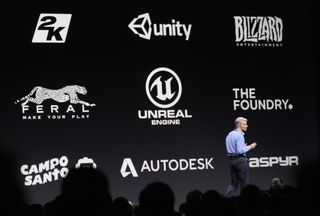Metal for OS X is so huge, I no longer need a Mac Pro


](/wwdc-2015)
Metal, Apple's optimized set of 3D tools for developers, first showed up on iOS last year in the form of a particularly beautiful Unreal Engine demo. it provided answers for serious problems that my development team faced when making cinematic games on the iPhone and iPad.
But Metal for OS X? The particle effects on stage were less impressive than last year's iOS demo, and moreover, while watching the demo onstage, I couldn't help but note that Unreal Engine games barely exist for the Mac. There's Tomb Raider, the Borderlands trilogy, X-Com, and a handful of indie titles, but many major games like Mass Effect haven't been ported.
I worried that "Metal" had become Apple's version of "Blast Processing," a catch phrase in the 90s for the Sega Genesis. In commercials, Sega would gloat that only the Genesis had "Blast processing." The only problem was, Blast Processing didn't really do anything that mattered.
But it turns out, I was wrong.
Metal for OS X is huge — and it's going to be a much bigger deal on the Mac than it is on your iPhone or iPad. If you use a Mac to produce professional content, chances are, Metal is about to drastically speed up the professional apps you use like Adobe Illustrator and Autodesk Maya.
Why Metal matters
Let's take a step back for a moment: Metal is a set of tools that Apple's third-party developers can use for 3D rendering. It bypasses the OpenGL framework — which on OS X is notoriously slow, dragging professional Mac apps down in comparison to their Windows counterparts.
Master your iPhone in minutes
iMore offers spot-on advice and guidance from our team of experts, with decades of Apple device experience to lean on. Learn more with iMore!
To give you an example, Giant Spacekat has a Mac at our office with both Windows and OS X installed. When we use the Unreal editor on the Windows side, importing a spaceship and assembling its materials only takes 10 seconds. On the OS X side, this same operation takes almost 50 seconds. If you're a professional user, those kinds of render delays make a huge difference in what platform you want to use.
Instead, Metal lets developers use tools that run "at the metal," optimizing the framework on a per-device basis. Only Apple can do this, in part because — compared to the competition — the company has a much more limited set of hardware than Android or Microsoft.
During Monday's keynote, Apple showed operations in the Unreal editor that would have slowed my Retina MacBook Pro to a crawl. Using Unreal 4 on OS X is painfully slow — so slow I've considered buying a Mac Pro to compensate for the performance lag.
But if Metal is really as fast as it seems, I'm hoping I won't have to.
It's good for the game-makers
After Adobe's spotty track record with Flash, it's easy to be suspicious at the company's ability to produce applications optimized for Apple's hardware. But when the company stopped by Apple's State of the Union presentation to show off how Metal has improved both After Effects and Illustrator, I was really impressed: After Effects rendering in particular showed a drastic improvement.

Two of the most important companies making professional apps for 3D professionals have also committed to using Metal in their apps: Autodesk and The Foundry. That's huge. Any 3D professional knows that the faster your machine displays your changes, the more detailed your work can be. Autodesk Maya users, for example, might be able to look forward to leaving complex shaders active as they model and animate.
It's fantastic for Mac gamers
Metal for OS X is even better if you're an active gamer on the Mac. After all, the framework won't just be limited to the Unreal engine: All the major game engines are committed to working with Metal. This includes both Unity and companies with proprietary engines like Blizzard and 2K.

As such, not only will we see some great Unreal games on the Mac, but some of the most important game companies will be making applications for OS X.
Perhaps most exciting is the commitment to Metal from Aspyr, a company that specializes in Mac ports of Windows games like Civilization. As grateful as I am that Beyond Earth made it to Mac, it's hard to not grouse when these ports consistently run much worse than on Windows. With Metal, we may be able to look forward to equally fast games, no matter the platform.
Time to construct some Metal
The devil is obviously in the details, and we'll see how Metal holds up in the real world when El Capitan rolls out this year. But, from everything I've seen at WWDC so far, Metal is the biggest reason for creative professionals to be excited, and I can't wait to start developing for it.

○ WWDC 2015 hub
○ iOS 9 hub
○ OS X 10.11 hub
○ Apple Watch hub
○ Swift hub
○ Discussion forums
Head of Development at Giant Spacekat. Host of Isometric and Rocket on Relay.FM. Godzilla of tech feminists.
Most Popular






